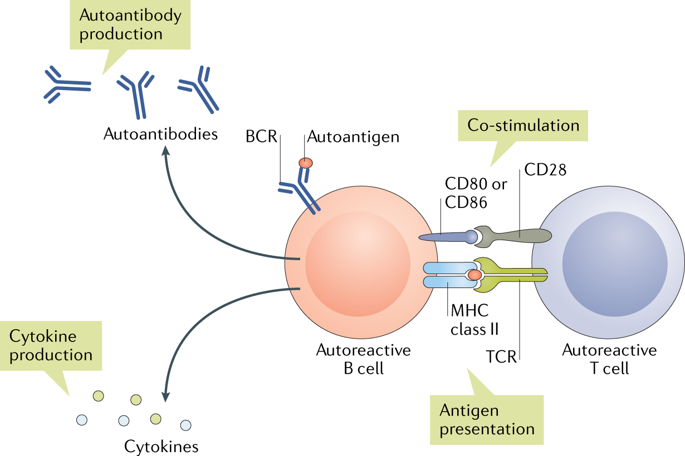当前位置:
X-MOL 学术
›
Nat. Rev. Rheumatol.
›
论文详情
Our official English website, www.x-mol.net, welcomes your
feedback! (Note: you will need to create a separate account there.)
B cell checkpoints in autoimmune rheumatic diseases.
Nature Reviews Rheumatology ( IF 29.4 ) Pub Date : 2019-05-01 , DOI: 10.1038/s41584-019-0211-0 Samuel J S Rubin 1, 2, 3 , Michelle S Bloom 1, 2, 3 , William H Robinson 1, 2, 3
Nature Reviews Rheumatology ( IF 29.4 ) Pub Date : 2019-05-01 , DOI: 10.1038/s41584-019-0211-0 Samuel J S Rubin 1, 2, 3 , Michelle S Bloom 1, 2, 3 , William H Robinson 1, 2, 3
Affiliation

|
B cells have important functions in the pathogenesis of autoimmune diseases, including autoimmune rheumatic diseases. In addition to producing autoantibodies, B cells contribute to autoimmunity by serving as professional antigen-presenting cells (APCs), producing cytokines, and through additional mechanisms. B cell activation and effector functions are regulated by immune checkpoints, including both activating and inhibitory checkpoint receptors that contribute to the regulation of B cell tolerance, activation, antigen presentation, T cell help, class switching, antibody production and cytokine production. The various activating checkpoint receptors include B cell activating receptors that engage with cognate receptors on T cells or other cells, as well as Toll-like receptors that can provide dual stimulation to B cells via co-engagement with the B cell receptor. Furthermore, various inhibitory checkpoint receptors, including B cell inhibitory receptors, have important functions in regulating B cell development, activation and effector functions. Therapeutically targeting B cell checkpoints represents a promising strategy for the treatment of a variety of autoimmune rheumatic diseases.
中文翻译:

自身免疫性风湿病中的 B 细胞检查点。
B细胞在自身免疫性疾病包括自身免疫性风湿性疾病的发病机制中具有重要作用。除了产生自身抗体外,B 细胞还通过充当专业抗原呈递细胞 (APC)、产生细胞因子以及通过其他机制促进自身免疫。B 细胞活化和效应器功能受免疫检查点的调节,包括激活和抑制性检查点受体,这些受体有助于调节 B 细胞耐受、活化、抗原呈递、T 细胞帮助、类别转换、抗体产生和细胞因子产生。各种激活检查点受体包括与 T 细胞或其他细胞上的同源受体结合的 B 细胞激活受体,以及可以通过与 B 细胞受体共同参与为 B 细胞提供双重刺激的 Toll 样受体。此外,各种抑制性检查点受体,包括 B 细胞抑制性受体,在调节 B 细胞发育、激活和效应功能方面具有重要作用。治疗性靶向 B 细胞检查点代表了治疗多种自身免疫性风湿性疾病的有希望的策略。
更新日期:2019-05-16
中文翻译:

自身免疫性风湿病中的 B 细胞检查点。
B细胞在自身免疫性疾病包括自身免疫性风湿性疾病的发病机制中具有重要作用。除了产生自身抗体外,B 细胞还通过充当专业抗原呈递细胞 (APC)、产生细胞因子以及通过其他机制促进自身免疫。B 细胞活化和效应器功能受免疫检查点的调节,包括激活和抑制性检查点受体,这些受体有助于调节 B 细胞耐受、活化、抗原呈递、T 细胞帮助、类别转换、抗体产生和细胞因子产生。各种激活检查点受体包括与 T 细胞或其他细胞上的同源受体结合的 B 细胞激活受体,以及可以通过与 B 细胞受体共同参与为 B 细胞提供双重刺激的 Toll 样受体。此外,各种抑制性检查点受体,包括 B 细胞抑制性受体,在调节 B 细胞发育、激活和效应功能方面具有重要作用。治疗性靶向 B 细胞检查点代表了治疗多种自身免疫性风湿性疾病的有希望的策略。






























 京公网安备 11010802027423号
京公网安备 11010802027423号